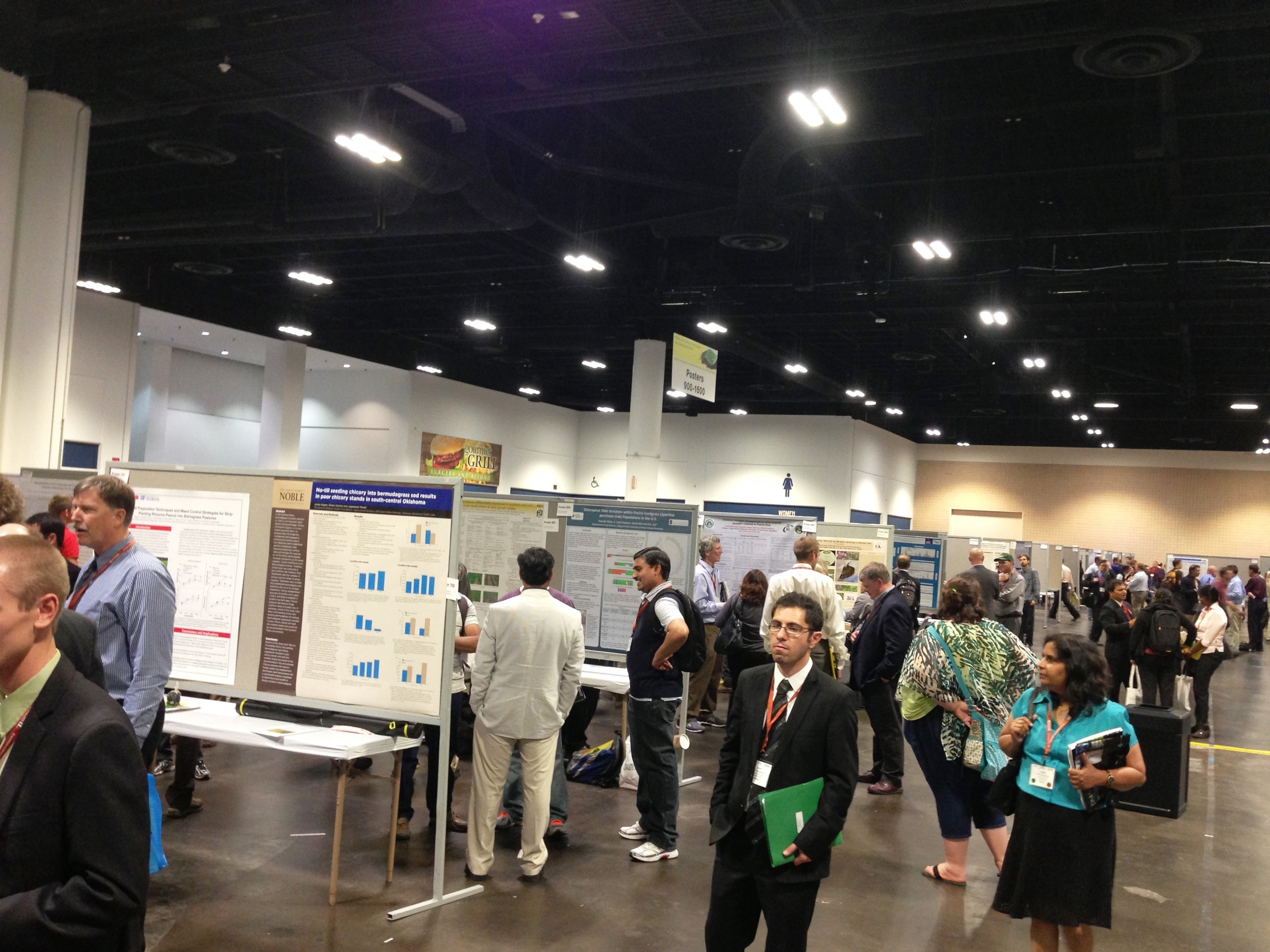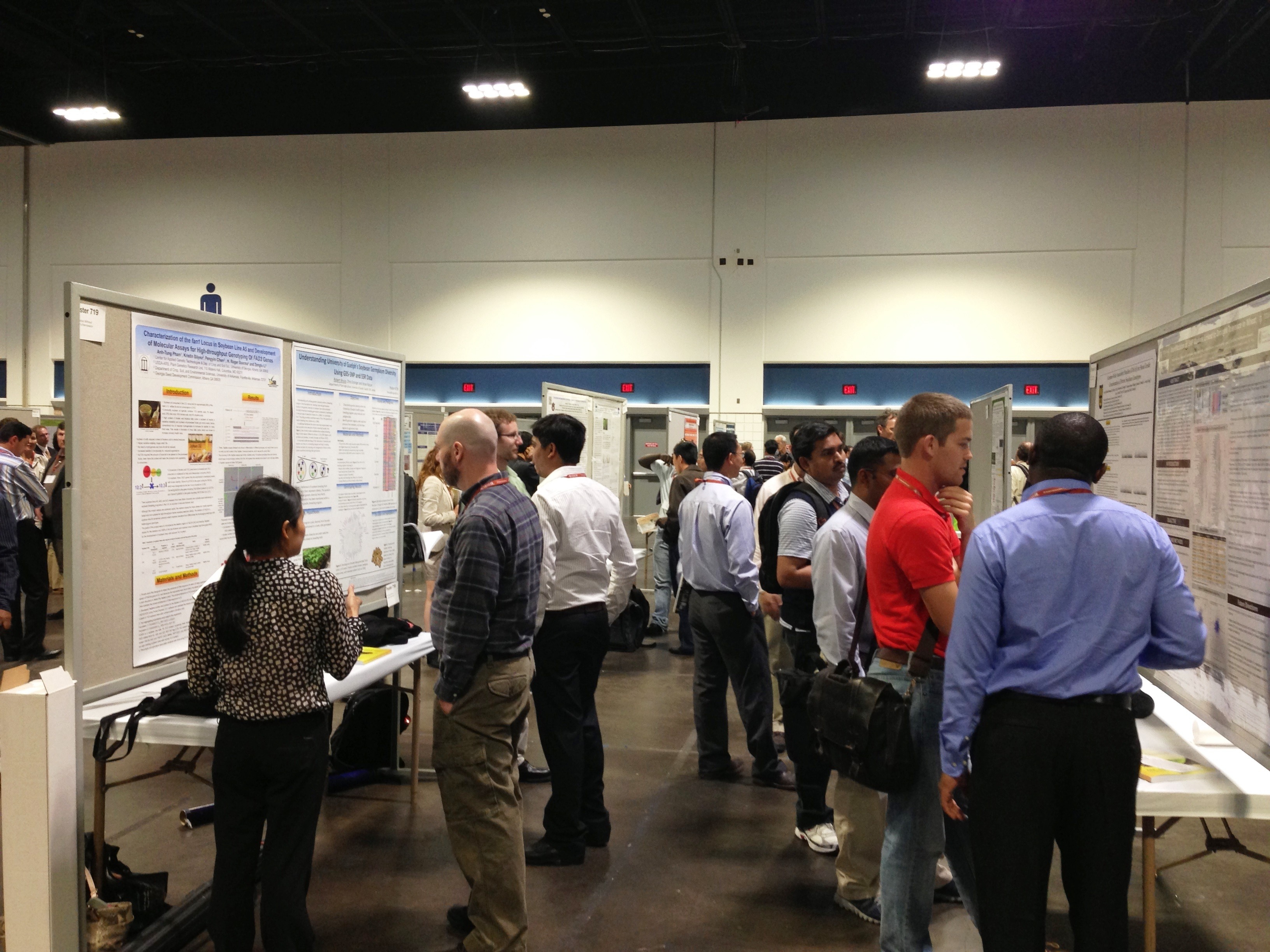by Danilo Gusmão de Quadros* (Advanced Biofuels USA) The substitution of fossil fuels by advanced biofuels per se has a huge impact on the environment through the reduction of greenhouse gas emissions, consequently mitigating global warming effects by the transportation sector. However, the environmental benefits of the substitution are much more comprehensive according to recent scientific results presented at the 2013 American Society of Agronomy (ASA) Annual Meeting.
 From November 3rd to 6th at Conventional Center and Marriot Westside beside the beautiful landscape of Tampa harbor, the 2013 Annual Meeting of ASA, joined with the Crop Science Society of America and Soil Science Society of America for a conference with the theme: “water, food, energy and innovation for a sustainable world”.
From November 3rd to 6th at Conventional Center and Marriot Westside beside the beautiful landscape of Tampa harbor, the 2013 Annual Meeting of ASA, joined with the Crop Science Society of America and Soil Science Society of America for a conference with the theme: “water, food, energy and innovation for a sustainable world”.
Being the most important scientific meeting of the year in the USA about agriculture, it was a huge congress with more than 4,000 attendees including scientists, professionals, educators, and students. Many themes, from food production and soil science to plant nutrition and water management, were covered in symposiums, plenaries, oral, and poster presentations highlighting the interface between bioenergy and the environment.
People seemed to be very interested in participating in many discussions, extending their participation into the night at the poster presentation which had the presence of many attendees. This was the opportunity to get to know each other and have interaction.
 When agronomists come together to discuss bioenergy, often the issue of food security arises. Concerns about converting food crops to biofuel crops and their effects on market prices are some of the main worries. In fact, biodiesel based on edible oils and ethanol based on corn may affect availability and, consequently, prices. However, today we have technology to have both: food and fuel. The alternatives already known can be highly beneficial in many aspects without affecting the food chain. The conversion of reusable oil to biodiesel and ligno-celulosic-based biofuels are good examples of how technology could change the world without increasing food prices.
When agronomists come together to discuss bioenergy, often the issue of food security arises. Concerns about converting food crops to biofuel crops and their effects on market prices are some of the main worries. In fact, biodiesel based on edible oils and ethanol based on corn may affect availability and, consequently, prices. However, today we have technology to have both: food and fuel. The alternatives already known can be highly beneficial in many aspects without affecting the food chain. The conversion of reusable oil to biodiesel and ligno-celulosic-based biofuels are good examples of how technology could change the world without increasing food prices.
What we could see in this congress were affirmative and concrete scientific results showing direct and indirect benefits from biofuels production, beyond the economic enhancement that could be achieved when, among other things, marginal lands are incorporated into the biofuels-based-on-feedstocks system.
Better crop practices have been studied to reduce nutrient removal and to increase soil organic matter. The main environmental points to take into consideration are: water recharge and quality, biodiversity, nutrient cycling, greenhouse gas emissions, and carbon sequestration.
Biochar had great space in the congress and showed its highly relevant role in sustainable biofuel production systems. Its application can bring many benefits. Among them: water retention, carbon sequestration, and nutrient interactions.
Below are listed links and themes for more information about the works presented at the congress.
With regard to the organizational format of the congress, I would prefer to have, instead of punctual works with specific results in each interesting theme, a broader review presented by a specialist comparing many papers and summarizing the conclusions.
Another thing to make it easier for attendees and for people who will search on line is to reduce the number of sessions (originally around 400), because we had too much overlap in themes, resulting in some works related to bioenergy presented in other sessions.
It would also be useful to have extended abstracts (3-4 pages) online, not just abstracts. These points increase the value of articles like this and of our interviews. Enjoy!
*Dan Quadros is a Research Scholar at the University of Florida and Volunteer at Advanced Biofuels USA: E-mail: daniloquadros@hotmail.com
 To learn more about bioenergy research and education, cellulosic-based biofuels and biochar from a scientific point of view, listen to this exclusive interview with Dr. Kurt Spokas conducted by Dan Quadros, to Advanced Biofuels USA.
To learn more about bioenergy research and education, cellulosic-based biofuels and biochar from a scientific point of view, listen to this exclusive interview with Dr. Kurt Spokas conducted by Dan Quadros, to Advanced Biofuels USA.
Dr. Spokas works at the US Department of Agriculture – Agricultural Research Service. Also, he is an Adjunct Professor at the University of Minnesota. He is one of the most important American scientists when the subject is biochar. He was Chair for the ASA Biochar Community in this meeting. His research focus is the impact of management practices on the cycling of carbon, nitrogen, and other greenhouse gases in agricultural systems; the potential role of biochar application in improving soil fertility with an emphasis on the resulting net greenhouse gas balance; development of farming practices to improve water quality; and improving mathematical modeling of methane oxidation in soils to improve regional greenhouse gas inventories.
1 – How do you evaluate the importance of bioenergy area at this meeting?
2 – How can the production and utilization of renewable fuels be increased in the US?
3 – In addition to ethanol based on corn, what are the best feedstocks and conversion process options for advanced biofuels in the US?
4 – What will it take for cellulosic-based biofuel to become a reality?
5 - What is your opinion about the lack between cutting-edge research and bioenergy education in USA?
6 – About biochar, is there economic viability for its application in agriculture?
7 – Based on your long and deep experience in this area, what are the soil effects of biochar application?
8 – And how about environmental effects?
 To understand more about advanced biofuels based on feedstocks and the relationship with the environment listen to Dr. Dennis Ojima’s exclusive interview for Advanced Biofuels USA conducted by Dan Quadros.
To understand more about advanced biofuels based on feedstocks and the relationship with the environment listen to Dr. Dennis Ojima’s exclusive interview for Advanced Biofuels USA conducted by Dan Quadros.
He presented at the ASA meeting his cutting-edge research about environmental impacts of biofuels crops, mainly using low input perennial grasses in marginal lands. Dr Ojima is Professor in the Ecosystem Science and Sustainability Department and Senior Research Scientist in the Natural Resource Ecology Laboratory in the Warner College of Natural Resources at Colorado State University and a Senior Scholar at the H. John Heinz III Center for Science, Economics, and the Environment. His research addresses climate and land use changes on ecosystems, carbon sequestration, and adaptation and mitigation strategies to climate change.
He is an Aldo Leopold Leadership Fellow and has received recognition for his international contributions for his involvement in the Millennium Ecosystem Assessment, receiving the 2005 Zayed International Prize for the Environment and the International Panel on Climate Change (IPCC) 2007 Nobel Peace Prize
1-What are the benefits of biofuel production based on biomass from economic and social perspectives?
2 – Could you list direct and indirect environmental effects of fossil fuels substitution by biofuels?
3 – Could you describe, based on your research, the impacts of converting traditional crops in biofuels crops on the environment?
4 – Could carbon storage be listed as an important benefit of this conversion?
5 – The use of cellulosic-based biofuel production has not yet reached the amounts predicted in the Energy Independent Security Act, 2007. In your point of view, what happened?
6 – How do you see the future of cellulosic-based biofuel in the USA?
7 – The Government seems to be applied in get advanced biofuels from cellulosic sources, however the funds for research have been reduced. As a recognized scientist, how do you see this paradigm?
Theme: Bioenergy systems
Focus: Biofuel crops, agronomic characteristics, environmental impacts and cultivation practices
Link: https://scisoc.confex.com/crops/2013am/webprogram/Session11335.html
Link: https://scisoc.confex.com/crops/2013am/webprogram/Session11336.html
Theme: Bioenergy crops, biomass production, and soil and environmental quality
Focus: How production and harvest of bioenergy crops will affect environmental quality.
Link: https://scisoc.confex.com/crops/2013am/webprogram/Session11226.html
Theme: Bioenergy production and environmental consequences
Focus: How production and harvest of bioenergy crops will affect environmental quality.
Link: https://scisoc.confex.com/crops/2013am/webprogram/Session11225.html
Theme: Impact of bioenergy systems on soil carbon changes and greenhouse gas fluxes
Focus: Soil carbon dynamics and greenhouse gas emissions from bioenergy management systems.
Link: https://scisoc.confex.com/crops/2013am/webprogram/Session11214.html
Link: https://scisoc.confex.com/crops/2013am/webprogram/Session11211.html
Theme: Integration of perennials to enhance agroecosystem services and provide renewable energy sources
Focus: Integrating row crops and perennial grass such as switch grass, miscanthus, etc. as feedstock for energy source and enhance soil quality, wildlife habitat, water quality, etc. This will change the existing cropping system paradigm to utilize marginal land or highly erodible soil on field and landscape level for perennials, and reduce the effect and stress of row cropping systems on natural resources and reduce reliance on crop residue such as corn for cellulosic ethanol production as it is taking place in the Midwest currently.
Link: https://scisoc.confex.com/crops/2013am/webprogram/Session11219.html
Theme: Biochar: agronomic and environmental uses
Focus: Agronomic and environmental uses of biochar.
Link: https://scisoc.confex.com/crops/2013am/webprogram/Session11477.html
Link: https://scisoc.confex.com/crops/2013am/webprogram/Session11476.html
Theme: Biochar effects on soil nutrients, plant growth and agronomic yields
Focus: The theme of this topical session is to present results on field, lab, and greenhouse scale studies on the impact of biochar additions on crop productivity and yield. In addition, studies that focus on soil nutrient availability, leaching, or retention are also welcome in this session due to their direct implications on agronomic productivity. The goal is to improve our understanding of biochar interactions with agronomic production.
Link: https://scisoc.confex.com/crops/2013am/webprogram/Session11324.html
Theme: Interactions between soil biotic communities and biochar: implications for plant health, nutrient cycling and environmental quality.
Focus: Interaction of microbial communities with black C or biochar. Effects of biochar on plant disease suppression, mycorrhizal colonization, the legume/rhizobium symbiosis and other plant/microbe interactions.
Link: https://scisoc.confex.com/crops/2013am/webprogram/Session11772.html
Link: https://scisoc.confex.com/crops/2013am/webprogram/Session11773.html
Nearly 55,000 articles in our online library!
Use the categories and tags listed below to access the nearly 50,000 articles indexed on this website.
Advanced Biofuels USA Policy Statements and Handouts!
- For Kids: Carbon Cycle Puzzle Page
- Why Ethanol? Why E85?
- Just A Minute 3-5 Minute Educational Videos
- 30/30 Online Presentations
- “Disappearing” Carbon Tax for Non-Renewable Fuels
- What’s the Difference between Biodiesel and Renewable (Green) Diesel? 2020 revision
- How to De-Fossilize Your Fleet: Suggestions for Fleet Managers Working on Sustainability Programs
- New Engine Technologies Could Produce Similar Mileage for All Ethanol Fuel Mixtures
- Action Plan for a Sustainable Advanced Biofuel Economy
- The Interaction of the Clean Air Act, California’s CAA Waiver, Corporate Average Fuel Economy Standards, Renewable Fuel Standards and California’s Low Carbon Fuel Standard
- Latest Data on Fuel Mileage and GHG Benefits of E30
- What Can I Do?
Donate
DonateARCHIVES
- February 2026
- January 2026
- December 2025
- November 2025
- October 2025
- September 2025
- August 2025
- July 2025
- June 2025
- May 2025
- April 2025
- March 2025
- February 2025
- January 2025
- December 2024
- November 2024
- October 2024
- September 2024
- August 2024
- July 2024
- June 2024
- May 2024
- April 2024
- March 2024
- February 2024
- January 2024
- December 2023
- November 2023
- October 2023
- September 2023
- August 2023
- July 2023
- June 2023
- May 2023
- April 2023
- March 2023
- February 2023
- January 2023
- December 2022
- November 2022
- October 2022
- September 2022
- August 2022
- July 2022
- June 2022
- May 2022
- April 2022
- March 2022
- February 2022
- January 2022
- December 2021
- November 2021
- October 2021
- September 2021
- August 2021
- July 2021
- June 2021
- May 2021
- April 2021
- March 2021
- February 2021
- January 2021
- December 2020
- November 2020
- October 2020
- September 2020
- August 2020
- July 2020
- June 2020
- May 2020
- April 2020
- March 2020
- February 2020
- January 2020
- December 2019
- November 2019
- October 2019
- September 2019
- August 2019
- July 2019
- June 2019
- May 2019
- April 2019
- March 2019
- February 2019
- January 2019
- December 2018
- November 2018
- October 2018
- September 2018
- August 2018
- July 2018
- June 2018
- May 2018
- April 2018
- March 2018
- February 2018
- January 2018
- December 2017
- November 2017
- October 2017
- September 2017
- August 2017
- July 2017
- June 2017
- May 2017
- April 2017
- March 2017
- February 2017
- January 2017
- December 2016
- November 2016
- October 2016
- September 2016
- August 2016
- July 2016
- June 2016
- May 2016
- April 2016
- March 2016
- February 2016
- January 2016
- December 2015
- November 2015
- October 2015
- September 2015
- August 2015
- July 2015
- June 2015
- May 2015
- April 2015
- March 2015
- February 2015
- January 2015
- December 2014
- November 2014
- October 2014
- September 2014
- August 2014
- July 2014
- June 2014
- May 2014
- April 2014
- March 2014
- February 2014
- January 2014
- December 2013
- November 2013
- October 2013
- September 2013
- August 2013
- July 2013
- June 2013
- May 2013
- April 2013
- March 2013
- February 2013
- January 2013
- December 2012
- November 2012
- October 2012
- September 2012
- August 2012
- July 2012
- June 2012
- May 2012
- April 2012
- March 2012
- February 2012
- January 2012
- December 2011
- November 2011
- October 2011
- September 2011
- August 2011
- July 2011
- June 2011
- May 2011
- April 2011
- March 2011
- February 2011
- January 2011
- December 2010
- November 2010
- October 2010
- September 2010
- August 2010
- July 2010
- June 2010
- May 2010
- April 2010
- March 2010
- February 2010
- January 2010
- December 2009
- November 2009
- October 2009
- September 2009
- August 2009
- July 2009
- June 2009
- May 2009
- April 2009
- March 2009
- February 2009
- January 2009
- December 2008
- November 2008
- October 2008
- September 2008
- August 2008
- July 2008
- June 2008
- May 2008
- April 2008
- March 2008
- February 2008
- January 2008
- December 2007
- November 2007
- October 2007
- September 2007
- August 2007
- June 2007
- February 2007
- January 2007
- October 2006
- April 2006
- January 2006
- April 2005
- December 2004
- November 2004
- December 1987
CATEGORIES
- About Us
- Advanced Biofuels Call to Action
- Aviation Fuel/Sustainable Aviation Fuel (SAF)
- BioChemicals/Renewable Chemicals
- BioRefineries/Renewable Fuel Production
- Business News/Analysis
- Cooking Fuel
- Education
- 30/30 Online Presentations
- Competitions, Contests
- Earth Day 2021
- Earth Day 2022
- Earth Day 2023
- Earth Day 2024
- Earth Day 2025
- Executive Training
- Featured Study Programs
- Instagram TikTok Short Videos
- Internships
- Just a Minute
- K-12 Activities
- Mechanics training
- Online Courses
- Podcasts
- Scholarships/Fellowships
- Teacher Resources
- Technical Training
- Technician Training
- University/College Programs
- Events
- Coming Events
- Completed Events
- More Coming Events
- Requests for Speakers, Presentations, Posters
- Requests for Speakers, Presentations, Posters Completed
- Webinars/Online
- Webinars/Online Completed; often available on-demand
- Federal Agency/Executive Branch
- Agency for International Development (USAID)
- Agriculture (USDA)
- Commerce Department
- Commodity Futures Trading Commission
- Congressional Budget Office
- Defense (DOD)
- Air Force
- Army
- DARPA (Defense Advance Research Projects Agency)
- Defense Logistics Agency
- Marines
- Navy
- Education Department
- Energy (DOE)
- Environmental Protection Agency
- Federal Energy Regulatory Commission (FERC)
- Federal Reserve System
- Federal Trade Commission
- Food and Drug Administration
- General Services Administration
- Government Accountability Office (GAO)
- Health and Human Services (HHS)
- Homeland Security
- Housing and Urban Development (HUD)
- Interior Department
- International Trade Commission
- Joint Office of Energy and Transportation
- Justice (DOJ)
- Labor Department
- National Academies of Sciences Engineering Medicine
- National Aeronautics and Space Administration
- National Oceanic and Atmospheric Administration
- National Research Council
- National Science Foundation
- National Transportation Safety Board (NTSB)
- Occupational Safety and Health Administration
- Overseas Private Investment Corporation
- Patent and Trademark Office
- Securities and Exchange Commission
- State Department
- Surface Transportation Board
- Transportation (DOT)
- Federal Aviation Administration
- National Highway Traffic Safety Administration (NHTSA)
- Pipeline and Hazardous Materials Safety Admin (PHMSA)
- Treasury Department
- U.S. Trade Representative (USTR)
- White House
- Federal Legislation
- Federal Litigation
- Federal Regulation
- Feedstocks
- Agriculture/Food Processing Residues nonfield crop
- Alcohol/Ethanol/Isobutanol
- Algae/Other Aquatic Organisms/Seaweed
- Atmosphere
- Carbon Dioxide (CO2)
- Field/Orchard/Plantation Crops/Residues
- Forestry/Wood/Residues/Waste
- hydrogen
- Manure
- Methane/Biogas
- methanol/bio-/renewable methanol
- Not Agriculture
- RFNBO (Renewable Fuels of Non-Biological Origin)
- Seawater
- Sugars
- water
- Funding/Financing/Investing
- grants
- Green Jobs
- Green Racing
- Health Concerns/Benefits
- Heating Oil/Fuel
- History of Advanced Biofuels
- Infrastructure
- Aggregation
- Biofuels Engine Design
- Biorefinery/Fuel Production Infrastructure
- Carbon Capture/Storage/Use
- certification
- Deliver Dispense
- Farming/Growing
- Precursors/Biointermediates
- Preprocessing
- Pretreatment
- Terminals Transport Pipelines
- International
- Abu Dhabi
- Afghanistan
- Africa
- Albania
- Algeria
- Angola
- Antarctica
- Arctic
- Argentina
- Armenia
- Aruba
- Asia
- Asia Pacific
- Australia
- Austria
- Azerbaijan
- Bahamas
- Bahrain
- Bangladesh
- Barbados
- Belarus
- Belgium
- Belize
- Benin
- Bermuda
- Bhutan
- Bolivia
- Bosnia and Herzegovina
- Botswana
- Brazil
- Brunei
- Bulgaria
- Burkina Faso
- Burundi
- Cambodia
- Cameroon
- Canada
- Canary Islands
- Caribbean
- Central African Republic
- Central America
- Chad
- Chile
- China
- Colombia
- Congo
- Congo, Democratic Republic of
- Costa Rica
- Croatia
- Cuba
- Cyprus
- Czech Republic
- Denmark
- Dominican Republic
- Dubai
- Ecuador
- Egypt
- El Salvador
- Equatorial Guinea
- Estonia
- Eswatini/Swaziland
- Ethiopia
- European Union (EU)
- Fiji
- Finland
- France
- French Guiana
- Gabon
- Georgia
- Germany
- Ghana
- Global South
- Greece
- Greenland
- Grenada
- Guatemala
- Guinea
- Guyana
- Haiti
- Honduras
- Hong Kong
- Hungary
- Iceland
- India
- Indonesia
- Iran
- Iraq
- Ireland
- Israel
- Italy
- Ivory Coast
- Jamaica
- Japan
- Jersey
- Jordan
- Kazakhstan
- Kenya
- Korea
- Kosovo
- Kuwait
- Laos
- Latin America
- Latvia
- Lebanon
- Liberia
- Lithuania
- Luxembourg
- Macedonia
- Madagascar
- Malawi
- Malaysia
- Maldives
- Mali
- Malta
- Marshall Islands
- Mauritania
- Mauritius
- Mexico
- Middle East
- Moldova
- Monaco
- Mongolia
- Morocco
- Mozambique
- Myanmar/Burma
- Namibia
- Nepal
- Netherlands
- New Guinea
- New Zealand
- Nicaragua
- Niger
- Nigeria
- North Africa
- North America
- North Korea
- Northern Ireland
- Norway
- Oman
- Pakistan
- Panama
- Papua New Guinea
- Paraguay
- Peru
- Philippines
- Poland
- Portugal
- Qatar
- Republic of
- Romania
- Russia
- Rwanda
- Saudi Arabia
- Scotland
- Senegal
- Serbia
- Sierra Leone
- Singapore
- Slovakia/Slovak Republic
- Slovenia
- Solomon Islands
- South Africa
- South America
- South Korea (Republic of Korea)
- South Sudan
- Southeast Asia
- Spain
- Sri Lanka
- Sudan
- Suriname
- Sweden
- Switzerland
- Taiwan
- Tanzania
- Thailand
- Timor-Leste
- Togo
- Trinidad and Tobago
- Tunisia
- Turkey
- Uganda
- UK (United Kingdom)
- Ukraine
- United Arab Emirates UAE
- Uruguay
- Uzbekistan
- Vatican
- Venezuela
- Vietnam
- Wales
- Zambia
- Zanzibar
- Zimbabwe
- Marine/Boat Bio and Renewable Fuel/MGO/MDO/SMF
- Marketing/Market Forces and Sales
- Opinions
- Organizations
- Original Writing, Opinions Advanced Biofuels USA
- Policy
- Presentations
- Biofuels Digest Conferences
- DOE Conferences
- Bioeconomy 2017
- Bioenergy2015
- Biomass2008
- Biomass2009
- Biomass2010
- Biomass2011
- Biomass2012
- Biomass2013
- Biomass2014
- DOE Project Peer Review
- Other Conferences/Events
- R & D Focus
- Carbon Capture/Storage/Use
- Co-Products
- Feedstock
- Logistics
- Performance
- Process
- Vehicle/Engine/Motor/Aircraft/Boiler/Ship
- Yeast
- Railroad/Train/Locomotive Fuel
- Resources
- Books Web Sites etc
- Business
- Definition of Advanced Biofuels
- Find Stuff
- Government Resources
- Scientific Resources
- Technical Resources
- Tools/Decision-Making
- Rocket/Missile Fuel
- Sponsors
- States
- Alabama
- Alaska
- Arizona
- Arkansas
- California
- Colorado
- Connecticut
- Delaware
- Florida
- Georgia
- Hawai'i
- Idaho
- Illinois
- Indiana
- Iowa
- Kansas
- Kentucky
- Louisiana
- Maine
- Maryland
- Massachusetts
- Michigan
- Midwest
- Minnesota
- Mississippi
- Missouri
- Montana
- Native American tribal nation lands
- Nebraska
- Nevada
- New Hampshire
- New Jersey
- New Mexico
- New York
- North Carolina
- North Dakota
- Ohio
- Oklahoma
- Oregon
- Pennsylvania
- Puerto Rico
- Rhode Island
- South Carolina
- South Dakota
- Tennessee
- Texas
- Utah
- Vermont
- Virginia
- Washington
- Washington DC
- West Coast
- West Virginia
- Wisconsin
- Wyoming
- Sustainability
- Uncategorized
- What You Can Do
tags
© 2008-2023 Copyright Advanced BioFuels USA. All Rights reserved.
.jpg)





0 COMMENTS
Leave A Comment
Your Email Address wiil not be Published. Required Field Are marked*